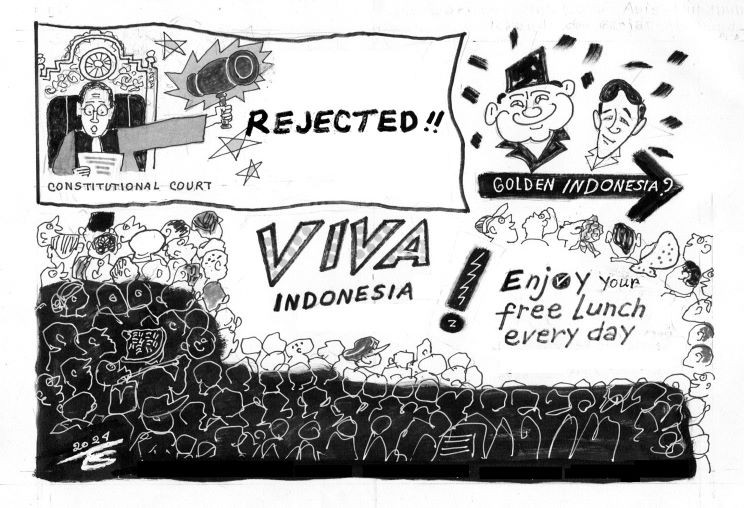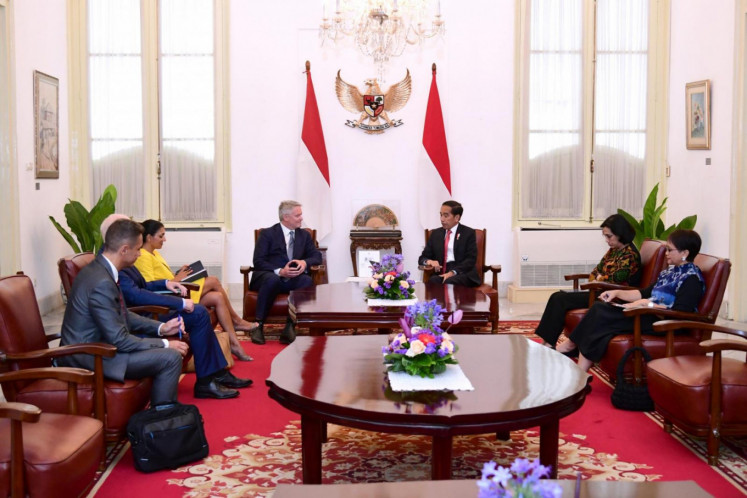Internet meme: A new politics of ideas?
Change Size
 Citizens now have more outlets in expressing their thought by utilizing social media and messaging apps to respond to the news and give unsolicited commentaries on the most-debated subject in political affairs. (Shutterstock/File)
Citizens now have more outlets in expressing their thought by utilizing social media and messaging apps to respond to the news and give unsolicited commentaries on the most-debated subject in political affairs. (Shutterstock/File)
Politics in the age of media convergence differs from a few decades ago.
Citizens now have more outlets in expressing their thought by utilizing social media and messaging apps to respond to the news and give unsolicited commentaries on the most-debated subject in political affairs. The use of hashtags and memes are prevalent. The meme is described by the academic Limor Shifman as a digital and user-generated content comprising one or a combined element of multimedia items.
The basic ingredients of meme could be a simple picture of renowned persons edited anonymously, often with a short text or conversation bubble. This ranges from the making of a picture of lawmakers, top politicians, ministers or presidents, featuring their unique and signature facial expressions which are digitally edited and cluttered with funny or satirical message to a short clip, whose dubbing and subtitles are altered to serve a certain purpose.
The meme circulating across social media timelines signifies public creativity, resulting from cyber activism and increased voluntary engagement by citizens in the public narrative, thanks to the widespread ownership of handheld gadgets.
Indonesian netizen’s eagerness in using social media reflects the nation’s culture of participation in the digital era. In early 2017, Twitter reported Indonesia was the fifth country of Twitter users, with some 4.1 billion tweets sent from the country. Both trends indicate a high degree of activity and intense flow of online (accessible) content which at any rates are searchable worldwide through tracking a line of hashtag.
The apparent fondness of engaging in public debate and reacting to the political narrative via social media substantiates a premise that highly political matter is not only a theme of discussion raised by high-profile policy makers, but cascading down to everyday conversation among ordinary citizens. This reality is nevertheless susceptible to the irresponsible and derogatory content attributable to meme’s anonymous nature.
Some years ago, ideas or aspirations were best presented by the pressure of interest groups, political parties or fractions in the legislature largely due to their ingrained power in persuading and mobilizing the masses. With the advent of digital communication the origin of social change initially driven by ideas is no longer sourced from the formal, hierarchical and structured institution. Instead, internet has capacitated individuals to pitch their own opinion, initiate a movement, and land themselves in a circumstance equally influential to that of formal political forces.
Internet memes feed the cyberspace with ideas, a subtle movement, and political campaign. Meme diffusion which easily escalates from a content merely shared by an individual to an item rapidly consumed by masses, highlights an important feature of broad reachability and friendliness to all segments of society, which is essential for political framing. As noted by Shifman, memes encapsulate a pot of ideas, communicative technique, and textually powerful social interaction.
The researchers Colin Lankshear and Michele Knobel take memes even more seriously; though meme’s coverage is at the micro level (individual-to-individual), its repercussion is larger than its scope of diffusion. It can shape mindsets, social behavior and attitudes of numerous social groups.
Meme functions as a presenter of ideas that conceals or clearly pitches a subjective interest.
Take a viral meme created on Susi Pudjiastuti, the popular Fisheries and Marine Affairs Minister. Her campaign on consuming fish for a healthy diet is made into a meme with a twist on her campaign against illegal fishing: “… anyone who doesn’t eat fish, I will sink them”. A jargon, tagline, motto, and a short quote on a picture sums up a key message at the end.
The underlying issue of market sustainability in fisheries is a complex process involving supply and demand balancing effort, national purchasing power, and maritime culture cultivation that entails problem solving. One solution is promoting fish consumption across the nation, also for the population’s health. Indeed, the promotion is at the heart of government’s interest, which received huge public response.
Susi’s popularity appeared to increase; the meme seemed to have successfully helped the government policy in promoting fish consumption.
Meme flourishes because it benefits from internet penetration and regular use of social networking sites: shareability and readability. Passing a meme to others is not burdensome. Meanwhile an immense degree of readability occurs when even the most digitally-illiterate people can still access the meaning ascribed to a meme. Both aspects have made meme popularly circulated amongst citizens.
***
The writer is a visiting lecturer at Sosioteknologi, Bandung Institute of Technology and an alumna of LPDP scholarship funded by Indonesian’s Finance Ministry. She can be contacted at febbyrwid@gmail.com; Linkedin profile: https://www.linkedin.com/in/febbyrstw/; Twitter: @febbyrstw









